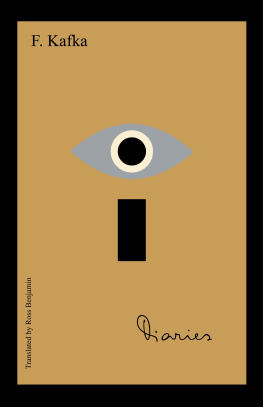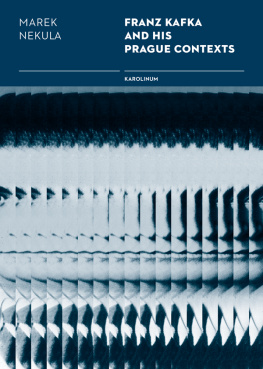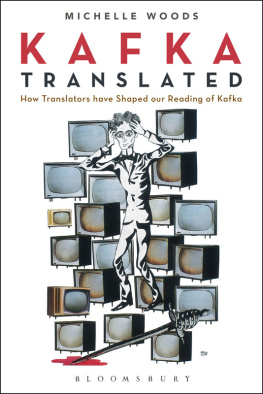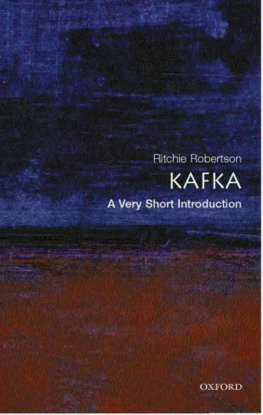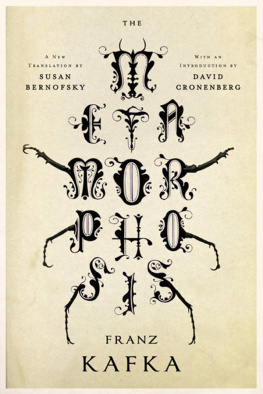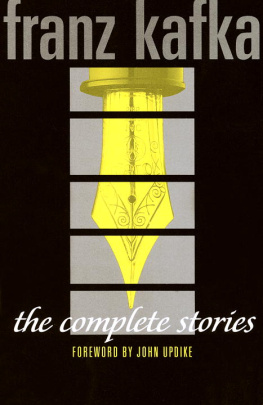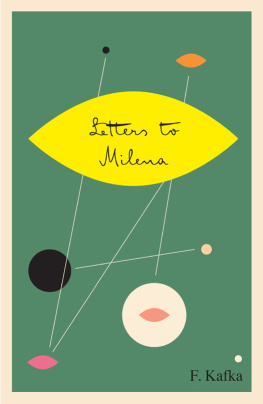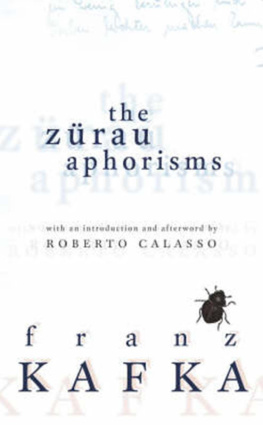N o life of Franz Kafka could have been writtenor, for that matter, would have been writtenhad it not been for the vision and courage of Max Brod. It was he who twice rescued Kafkas work, first from physical destruction, later from indifference and oblivion. To Brod we also owe the first biography of Kafka, a profoundly personal document published in 1937. That the biographer, in this instance, also happened to be his subjects closest friend, a witness to his life and times, may not have been an unmixed blessing; familiarity breeds blind spots, and the view from up close tends to distort ones perspective. But while Brods opinions and conclusions may be open to challenge, no one now living can hope to match his intimate, firsthand knowledge of Kafkas world. Like all Kafka biographies, the present one is therefore a tribute to Max Brods dedication, loyalty, and to his singular generosity of spirit.
In the intervening half century, however, much new material relating to Kafka has emerged which Brod either chose to ignore or could not have known about. The bibliography lists the most relevant publications, but the work of Klaus Wagenbach and Hartmut Binder is in a class by itself and must be acknowledged as such. Their decades of research yielded an abundance of vital details and documents that would have been irretrievably lost without their efforts. I am greatly in their debt for many of the facts, even where I differ in my reading of them.
Many individuals in Europe, Israel, and the United States have generously shared their personal recollections or helped in the far-flung search for source material. I want to express my special thanks to Marianne Steiner, to Dr. Puah Menczel, Miriam Singer, and Moshe Spitzer, to Ruven Klingsberg, to Margot Cohn and the staff of the Israel National Library at Hebrew University, and to the librarians of the Leo Baeck Institute in New York. David Rieffs sensitive guidance and editorial support have been both exemplary and invaluable. I am immensely grateful to all of them.
E.P.
I N Prague, he is always present but never mentioned, and it comes as a shock suddenly to find oneself face to face with him in the heart of the cityKafkas brooding features, life-size, cast in black bronze and mounted above eye level on the wall of a drab building on Maisel Street. On this spot, so a small plaque proclaims, stood the house in which the writer Franz Kafka was born.
It is a modest memorial, conceived in ambivalence and therefore singularly fitting in its way. Commissioned by Communist authorities, designed by the sculptor Karel Hadlik, and unveiled in 1965, at a time when the human face of socialism began to rise above the parapets of Stalinoid concrete, it was intended as the initial stage in Kafkas metamorphosis from decadent nihilist into a revolutionary critic of capitalist alienation. In the summer of 1968, Soviet tanks put an end to liberal illusions, and further efforts at rehabilitating Kafka were suspended. But his presence, once acknowledged, is hard to exorcise in a town where every moment of the day and night recalls his nightmares. The bronze sculpture was left in place, so was the marker on his house in the Alchemists Laneconcessions to tourism, or one of those Schweikian triumphs of cunning that have kept the Czech cause alive through the ages. Either way, they bear witness to one all-important, fundamental fact of Kafkas existence: that he was born in Prague, was buried in Prague, and spent almost all forty-one years of his life in this citadel of lost causes, the little mother with claws that never loosened her grip on him and shaped his vision of the world.
An uncanny world in which to grow up, still solidly embedded in the Middle Ages, walled in by mystery and legend turned to stone. The view from the Kafka windows stretched back over the centuries, and every walk, every errand took the child through the vaulted archways and twisting alleys of a vengeful past. This was to be his lifes stage. Friedrich Thieberger, a renowned Jewish scholar with whom Kafka later studied Hebrew, recounts that once, as Franz and I were standing at the window looking down on Old Town Square, he pointed at the buildings and said: This was my high school, the university was over there, in the building facing us, my office a bit further to the left. This narrow circle and his finger described a few small circles, this narrow circle encompasses my entire life.
But long before the town became a concept in the childs mind, long before the physical reality of even his most immediate environment began to register in meaningful and coherent images, he had to find his way in the far more bewildering shadow world of very large, powerful human beings and learn to deal with the dual threat of both their presence and their absence. What Kafka chose to remember about his childhood is highly revealing, though no more so than what he chose to forget. Even a memory come alive, as he once described himself in one of his last diary entries, tends to be selective in ways determined by beginnings beyond memoryby a real-life mother who unwittingly betrayed him long before her image fused with the symbol of his quest for love, just as the real-life father, with his waxed mustache and drill-sergeant temper, preceded the image of divine omnipotence.
Posterity has come to know them only as Kafkas parentssuch are the perils of raising a writer in the family, especially a writer devoid of conscious hypocrisy. Yet Herrmann Kafka was already thirty-one years old when he became Kafkas father, a demanding role at best, for which he happened to be particularly ill equipped. The very qualities that had enabled him to claw his way out of grinding poverty into middle-class respectability and relative affluenceunself-conscious egotism, brute drive, and a single-minded concentration on money and statusdid not make for grace, warmth, and sensitivity in his contacts with people in general. As a parent, however, he suffered from an additional handicap: he himself had never had a childhood.
His own father, Jakob Kafka, born in 1814, was the second of nine childrensix boys and three girlsraised in a one-room shack in the Czech village of Wossek. Under the laws then in force, he was not permitted to marry; a 1789 decree promulgated to curb the growth of the Jewish population barred any but the oldest son of Jewish parents from obtaining a marriage license, and Jakob had a stepbrother older by a year. What saved him from dying without legitimate progenydeath twice over, in the context of his faithwas the revolution of 1848, or rather its savage repression. By the sort of ironic paradox that crops up with predictable unpredictability throughout Jewish history, the new constitution, designed to strengthen the hand of the autocratic government, brought Jews the very freedoms which the French Revolution and its aftershocks had promised but largely failed to deliver.
In granting full citizenship rights to the roughly 400,000 Jews within the empireincluding the right to marry at will, to settle in the cities, and to enter trades and professionsthe Habsburg bureaucracy was moved not by humanitarian impulses but by political and economic considerations. The business skills and energy of peddlers, moneylenders, and craftsmen were an untapped resource invaluable to a country on the verge of industrialization, and the Jews peculiar, cohesive, but supranational allegiance made them a potential counterforce to the radicalism of contending nationalities that threatened the survival of the multinational state. But all that mattered to Kafkas grandfather Jakob, in 1848, was that at last he could marry, and he proceeded to do so at once, taking as his wife the daughter of his next-door neighbor.



